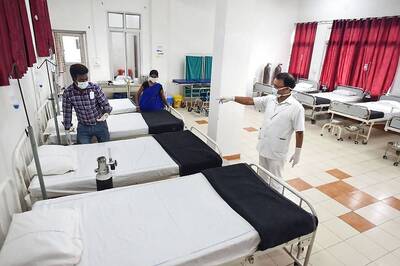
views
New Delhi: Headline inflation declined to an eight-month low of 9.22 per cent in July as the rate of price rise in food articles and petro-products eased, though pressure remained on manufactured items.
Inflation, as measured by the Wholesale Price Index (WPI), stood at 9.44 per cent in June. It was 9.98 per cent in July, 2010.
As per data released by the government, the overall inflation figure for May this year has been revised upward to 9.56 per cent from the provisional estimate of 9.06 per cent.
On an annual basis, prices of food articles went up by 8.19 per cent in July, which is lower than the 8.38 per cent inflation recorded in June.
Inflation in overall primary articles, which have a share of over 20 per cent in the WPI basket, stood at 11.30 per cent in July, down from 12.22 per cent in June.
However, prices of manufactured products, which have a weight of around 65 per cent in the WPI basket, went up by 7.49 per cent year-on-year in July.
Inflation in manufactured products has been steadily rising since February this year, when it crossed the 6 per cent mark. It was 7.43 per cent in June.
The index for the fuel and power segment stood at 12.04 per cent year-on-year in July, down from 12.85 per cent in the previous month. The index has a weight of almost 15 per cent in the WPI basket.
In addition, inflation in non-food primary articles moderated to 15.51 per cent in July from 18.57 per cent in June.
The July inflation number is the lowest in eight months. The previous low of 8.20 per cent was reported in November, 2010.
Although the headline inflation numbers for July have shown signs of moderation, the Reserve Bank is unlikely to take a breather on its monetary tightening policy as there is no respite in the rate of price rise in manufactured items.
This was the eighth consecutive month in which headline inflation has remained above the 9 per cent mark.
In his Independence Day address to the nation on Monday, Prime Minister Manmohan Singh said that sometimes the reasons for price rise lay outside the country and added that the government's efforts to tame inflation have not met with lasting success.
"The prices of petroleum products, food grains and edible oil have risen steeply in international markets in recent times. Since we import these products in large quantities, any rise in their prices adds to inflationary pressure in our country," Singh said.
Noting that sometimes the reasons for rising prices lay outside the country, Singh stressed that the government would consider new steps to arrest rising inflation.
However, the latest numbers are in line with the RBI's projection of a high inflation rate in the first half of the fiscal.
In its monetary policy for 2011-12, the central bank had said that continued high prices of global commodities, particularly oil, would continue to drive the rate of price rise.
The RBI had projected inflation to average 9 per cent for the first six months of 2011-12 before moderating to around 7 per cent by March-end.

















Comments
0 comment